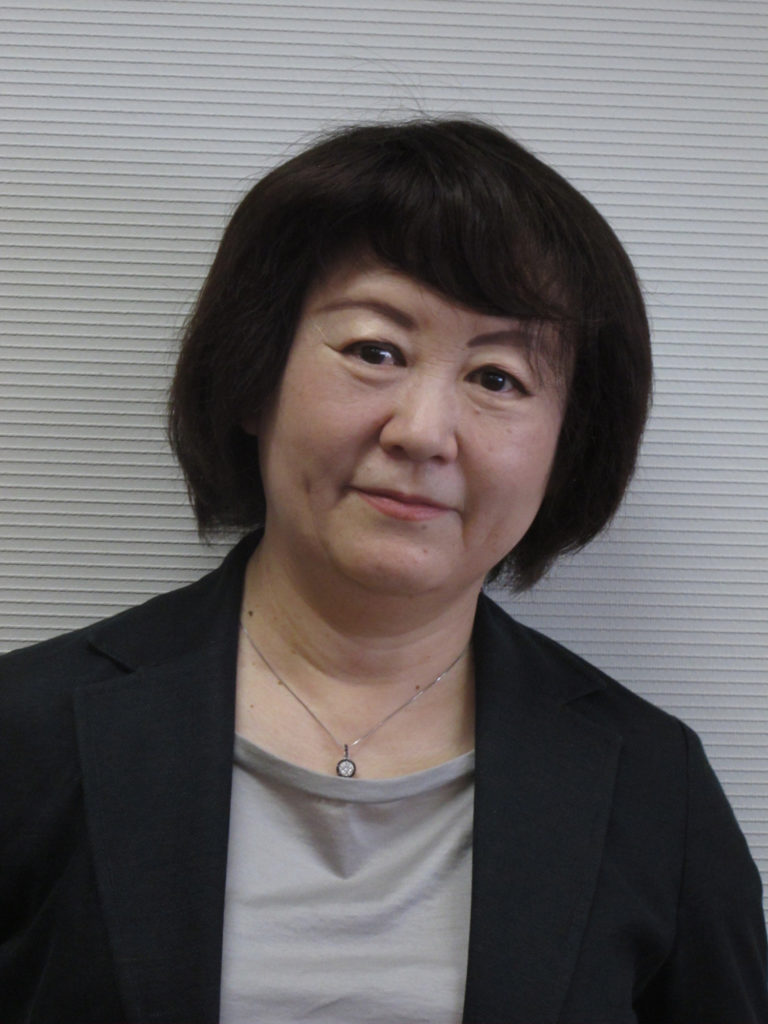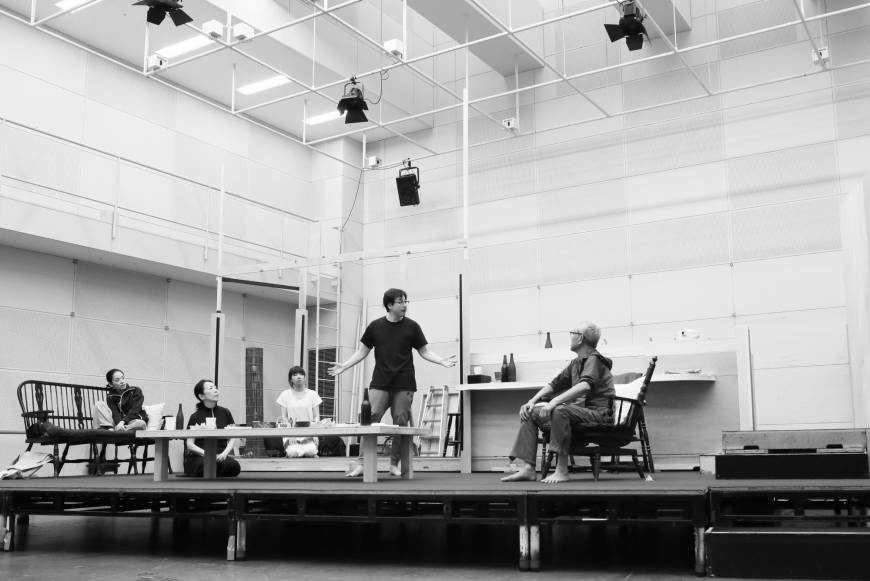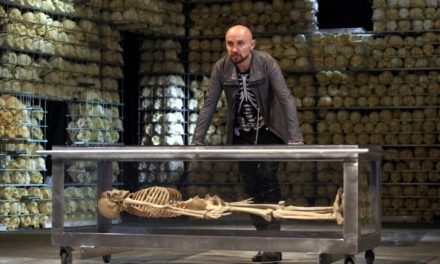After eight years as artistic director for drama at the New National Theatre, Tokyo, Keiko Miyata, 60, is now tackling her final program there before passing the baton to 39-year-old Eriko Ogawa, who is set to become the theatre’s youngest-ever director in September.
Rather than bowing out with a guaranteed crowd-pleaser, though, Miyata will mark this occasion by staging Morning Disappearance (Kieteikunara Asa), a contemporary drama she commissioned from emerging playwright and director Ryuta Horai.
Yet that’s not altogether surprising, because she launched her tenure at the Shinjuku Ward institution in 2010 with no less than a splendid, but unlikely, production of Norwegian playwright Henrik Ibsen’s challenging 1890 classic, Hedda Gabler, starring Mao Daichi, a top actress formerly with the all-female Takarazuka musical theatre troupe.
In between, Miyata—a renowned stage director who followed Hiroko Watanabe, Tamiya Kuriyama, and Hitoshi Uyama as the fourth artist in her role since the NNTT was founded in 1997—consistently cast her net wide. Besides featuring leading Japanese dramatists such as Yukio Mishima, Yoshiyuki Fukuda, and Kunio Kishida, she also presented works by Germany’s Bertolt Brecht, Ireland’s George Bernard Shaw, and American Arthur Miller—as well as Ibsen.

Departing words: The outgoing artistic director for drama at the New National Theatre, Tokyo, says she believes that “today’s theatre was built up by hundreds of forerunners’ wisdom and their works.” | Photo Nobuko Tanaka
Reflecting on her career at the NNTT, which has separate artistic directors for its ballet and opera departments, Miyata says,
“When I started, I didn’t know how long I would be in this job, but that kind of flow was actually my long-term intention all along.”
Speaking in the spacious drawing room at the NNTT, she continues:
“I opened my time with a gem by the father of modern drama and then introduced Western masterpieces one after another while also examining modern Japanese theatre. That gradually piled up a collective understanding both at the NNTT and among our audiences to the point where we arrived at Horai’s new work.”
In fact, Morning Disappearance marks a return to the NNTT for Horai, whose Mahoroba (A Splendid Location) was staged there two years before Miyata’s arrival. A superb drama that pitched the values and roles of four generations of women in the same family against each other, it then won the Kishida Kunio Award for 2008’s best play.
Perhaps mindful of that now-distant feather in the NNTT’s cap, Miyata says,
“Many people tend to take a short view of things and chase the trend, whereas I believe today’s theatre was built up by hundreds of forerunners’ wisdom and their works.
“While the performing arts of Kabuki and Noh seem to have an established position in Japan, I thought contemporary theatre didn’t have such a firm foothold. So I decided to confirm its roots and traditions by exploring them systematically with the audiences through my programs.”
Indeed, though the NNTT is at the center of today’s theatre scene in Japan, compared with most of its equivalents in Europe and elsewhere it is still very new. Consequently, as Miyata points out,
“The staff are still feeling things out every day.”
Despite this, she adds how proud she is of her team as audience numbers gradually continue to rise.
“To attract people who had never been interested in theater, and then to get them to come back again, we’ve tried various means and incentives,” she says.
For instance, she says they have sometimes programmed a series of several works staged by the same generation of directors or related to each other by theme. On one occasion, she also ran a sequence of three plays that were each performed by only two actors.
Despite such initiatives, Miyata admits there’s still a ways to go. Specifically, she says that although the NNTT has started a training center for young actors, and offers chances for young directors, there’s a pressing need to foster new writers.
“To be honest, it’s too risky to commit a new play to young playwrights who have mainly just written for their own companies and audiences of their own generation. But that’s certainly a big subject for the NNTT’s future,” she says.
Caveats aside, Miyata says she’s confident 42-year-old Horai will come up with the goods in Morning Disappearance.
“I trust his viewpoint and technique entirely, so I just asked him to write about what concerns him most in today’s Japan,” she says.
In response, Horai again looked to the family based on his own experiences. This time, he presents a successful playwright named Sadao (played by Kosuke Suzuki) who takes his new girlfriend, a young actress named Rei (Misa Yoshino), back to his family home with him when he returns for the first time in five years.
Although nobody asks Sadao about his job, that night he tells everyone gathered for the reunion that his next play may be about his family—which sets them all off arguing with him and each other. Among the recriminations, three children blame their mother, a zealous Jehovah’s Witness, for their misery, and others wade in to criticize Rei, while Sadao’s parents taunt each other saying they’ve wanted to get divorced for ages.
“I first found out that Horai had such complicated family issues when he created this great play, which poses a whole range of questions about family and love relationships, jobs and work, responsibility and happiness,” Miyata says. “So I’ve directed it extra carefully and sincerely to bring those realities to the stage rather than just creating dramatic entertainment.
“I’ve also tried to surprise the writer in a good way, so he sees something beyond what he put there that gives him an added perspective through my production.”
As the interview drew to a close, Miyata confides a regret, saying:
“As we have three different departments at the NNTT, I wanted to realize a communal project I called NNTT Matsuri (Festival) bringing together the three genres. I imagined that with just one ticket people would be able to enjoy a day out involving brief programs of drama, dance, and opera—along with food stalls and shops, of course. But sadly that didn’t happen.”
After she hands the reins over to Ogawa, though, Miyata will still head up the theatre’s training center for actors—so NNTT Matsuri may well be a great idea waiting to happen. Watch this space.
Morning Disappearance (Kieteikunara Asa) runs from July 12 to 29 at the New National Theatre, Tokyo. For more information, call 03-5352-9999 or visit www.nntt.jac.go.jp.
This article originally appeared in Japan Times on July 7, 2018, and has been reposted with permission.
This post was written by the author in their personal capacity.The opinions expressed in this article are the author’s own and do not reflect the view of The Theatre Times, their staff or collaborators.
This post was written by Nobuko Tanaka.
The views expressed here belong to the author and do not necessarily reflect our views and opinions.


















